

Introduction
- Web1, the earliest form of the internet, was mostly centered on users being consumers of whatever information was out there.
- Web 2 brought about the concept of user-generated content and applications, which is great. PayPal and Yandex are examples of web wallets that have been part of the Web2 era. However, the network controls much of the data, transactions, and other functions in Web2, which creates privacy concerns.
- Web3, which we’re steadily evolving into, is decentralization. Web3 applications are decentralized, giving users complete autonomy over their online interactions.
The evolution is fueled by blockchain technology, and crypto enthusiasts get to enjoy all these benefits.
The crypto wallets are designed to interact with dApps built on blockchain technology. They make it easy to manage your crypto and digital assets like NFTs and other tokens. There are more than 2.5 million wallets across all blockchains. You might have interacted with one without even knowing it.
Top Web3 Wallets for 2026
- MetaMask – The Best Overall
- Trust Wallet – The Best for Mobile Transactions
- Phantom Wallet – The Best for Comprehensive Management of Assets
- Coinbase – The Best Wallet for Instant Crypto Transactions
- Exodus Wallet – The Best Wallet for Total Control Over Your Digital Assets
- My Ether Wallet – The Best Non-Custodial and Open-source Wallet
- Torus Wallet – The Best for Beginners
- Binance Direct Wallet – The Most Secure DeFi Wallet
- Zerion Wallet – Ideal for Wallet-to-Wallet Transactions
- Argent Wallet – The Best for DeFi and Web3 Applications
Best Web3 Wallets Reviewed
Let’s explore the best wallets of 2026, including their features, benefits, and drawbacks, as well as our expert ratings.
1. MetaMask – The Best Overall
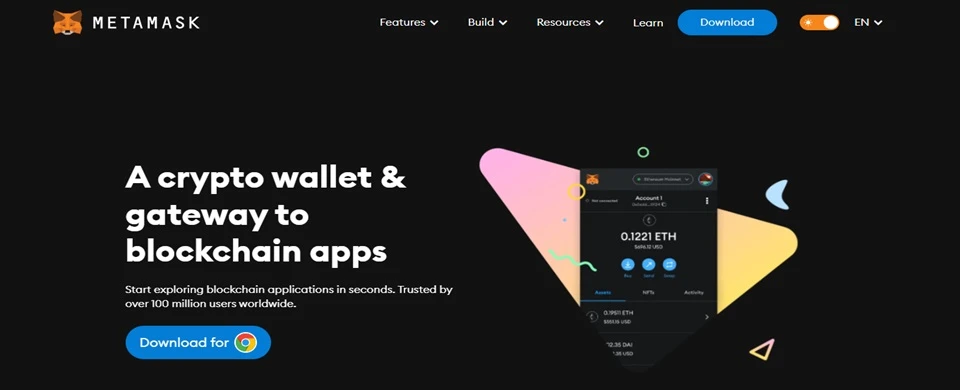
MetaMask was launched in 2016 and is Headquartered in San Francisco, California. The Consensys-owned wallet started as a browser extension that worked seamlessly with Firefox.
However, the company wanted to make a more versatile product for all its consumers and developed a downloadable app compatible with both Android and iOS.
MetaMask tops our list because of its high level of versatility and security.
It provides one of the best environments to:
- store your crypto,
- manage your ETH
- manage digital wallets.
It’s the most popular way for crypto enthusiasts to interact with websites using Ethereum and also Dapps.
While it’s not possible to store Bitcoin in this wallet, you can wrap the currency and store it as WBTC. MetaMask supports Polyon, BNB Smartchain, and Ethereum.
- It’s also one of the most secure wallets offering clients passwords and seed phrases to secure their tokens and other digital assets.
Metamask Wallet also offers an impressive selection of 18 languages to its users across the globe, including English, French, German, Arabic, Russian, Bahasa, Turkish, Vietnamese, Dutch, Romanian, Chinese, Japanese, Korean, Ukrainian, Thai, Dutch, Italian and Filipino.
The platform has more than 10 million active users across the globe, and regularly updates its privacy settings to match changes in the industry. It takes the top position because of its decentralized and non-custodial nature, which are the hallmarks of Web3.
We’d give it an overall rating of 4.8/5.
-
Pros
-
 Connects to almost all Dapps on Ethereum’s blockchain
Connects to almost all Dapps on Ethereum’s blockchain -
 It accepts both Bitcoin and Ethereum
It accepts both Bitcoin and Ethereum -
 The setup process is simple for beginners in crypto
The setup process is simple for beginners in crypto -
 Users can get rewards for staking and holding
Users can get rewards for staking and holding -
 It has a browser extension for ease of access
It has a browser extension for ease of access
-
Cons
-
 Very limited support of other coins besides Eth and its tokens
Very limited support of other coins besides Eth and its tokens -
 Less secure than hardware wallets
Less secure than hardware wallets -
 It does not offer coin-to-fiat conversion
It does not offer coin-to-fiat conversion
2. Trust Wallet – The Best for Mobile Transactions
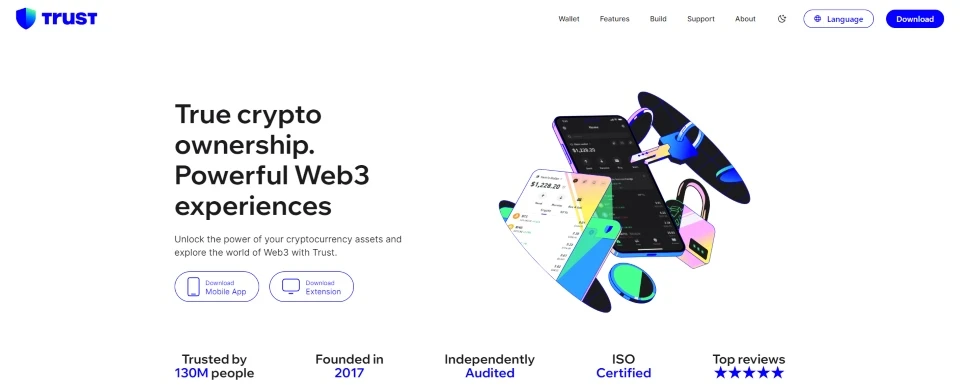
Trust Wallet is a product of Binance Labs. It is a separate product from the Binance CEX, and the wallet attached to it. Before its acquisition by Binance, Trust was owned by Victor Radchenko who started it in 2017.
After Binance Labs acquired it in 2018, they embarked on making it more user-friendly and versatile. It currently supports more than 33 chains and their tokens.
The most impressive quality of Trust Wallet is that it supports more than 250,000 tokens across chains like Polygon, xDai, Solana, Tezos, BNB Smartchain, and many others.
The app is available for Android, and iOS, and also as a Chrome extension.
- Trust Wallet has an impressive open-source code and is constantly being improved upon.
It is available in English, Vietnamese, French, Turkish, Chinese, German, Portuguese, Japanese, Bahasa, Korean, and Japanese.
It stores ETH in a secure environment and interacts with dApps within the Ethereum blockchain. Users can also stake their tokens on the desktop wallet.
Trust is user-friendly and popular, which is why we give it a 4.7/5.
-
Pros
-
 It is decentralized and non-custodial, and you’re always in control of your assets
It is decentralized and non-custodial, and you’re always in control of your assets -
 The code is open-source, which makes it easier to improve its kinks
The code is open-source, which makes it easier to improve its kinks -
 It supports more than 33 blockchains and their tokens
It supports more than 33 blockchains and their tokens -
 The mobile application has a simple and user-friendly interface
The mobile application has a simple and user-friendly interface -
 You can easily buy tokens with a credit card on the web version of the wallet
You can easily buy tokens with a credit card on the web version of the wallet
-
Cons
-
 Low level of security because it’s a hot wallet
Low level of security because it’s a hot wallet
3. Phantom Wallet – The Best Wallet for Comprehensive Management of Digital Assets
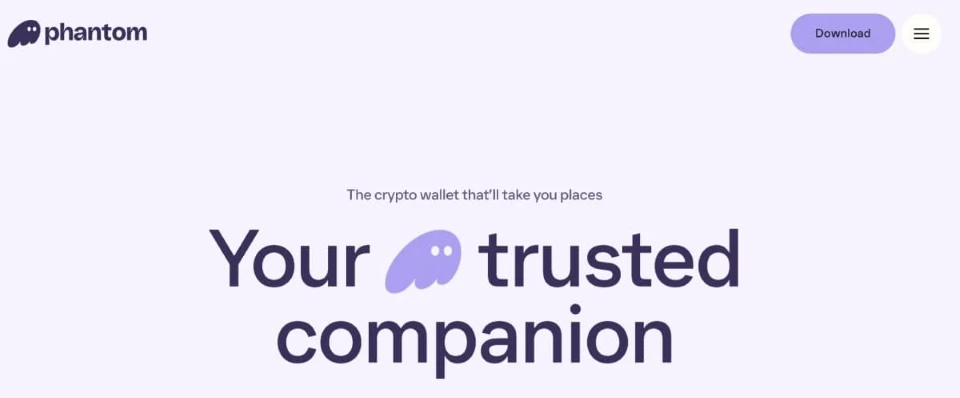
Phantom Wallet was launched in January 2022 as a re-imagined digital wallet for DeFi and NFTs. The company, Phantom Technologies, has its headquarters in San Francisco, California.
- The wallet simplifies sending, receiving, storing, and swapping of tokens on the Solana Blockchain.
- However, the App has evolved and currently also supports Ethereum and Polygon Networks.
It has both mobile and a browser version, and allows users to access many decentralized apps across the Web3 landscape. Users can easily access Uniswap, Aave, Blur, and OpenSea through this wallet.
The user interface is closely modeled to resemble MetaMask, which means it matches the latter’s user-friendly, easy-to-set-up, and intuitive design.
Phantom app is currently available for Android and iOS and also has a browser extension that works with Chrome, Brave, Firefox, and Edge. The most impressive features include that it’s non-custodial, allows token swaps, and also allows users to get NFTs and collectibles.
- It currently works with Solana, Ethereum, and Polygon Apps.
Language options include Thai, Vietnamese, Portuguese, Turkish, Filipino, Chinese, Bengali, Japanese, Korean, English, Spanish, German, French, Italian, Punjabi, Swahili, Tamil, Telugu, Yoruba, Burmese, Amharic, Arabic, Gujarati, Chinese, Russian, Hindi, Indonesian, Malay, Hausa, and Igbo.
The app is constantly coming up with improvements to give its users a positive experience, which is why we’ve ranked it third with an overall score of 4.6/ 5.
-
Pros
-
 NFTs are grouped according to similarity for easy search
NFTs are grouped according to similarity for easy search -
 The wallet is non-custodial and the user has complete control and autonomy over their assets
The wallet is non-custodial and the user has complete control and autonomy over their assets -
 It’s possible to perform token swaps, and the app displays information like the slippage, tolerance and estimated fee
It’s possible to perform token swaps, and the app displays information like the slippage, tolerance and estimated fee -
 The wallet supports transactions with Ledger Nano X, making it possible to securely store your digital assets offline
The wallet supports transactions with Ledger Nano X, making it possible to securely store your digital assets offline -
 It merges seamlessly with 93 dApps, including Audius, Soldate, Affiliarum, Apex, Protocol, and many others
It merges seamlessly with 93 dApps, including Audius, Soldate, Affiliarum, Apex, Protocol, and many others -
 Users can also stake Solana tokens and receive rewards for it
Users can also stake Solana tokens and receive rewards for it
-
Cons
-
 The software is currently not open-source
The software is currently not open-source -
 It shares the vulnerabilities that come with all other hot wallets
It shares the vulnerabilities that come with all other hot wallets
4. Coinbase – The Best Wallet for Instant Crypto Transactions
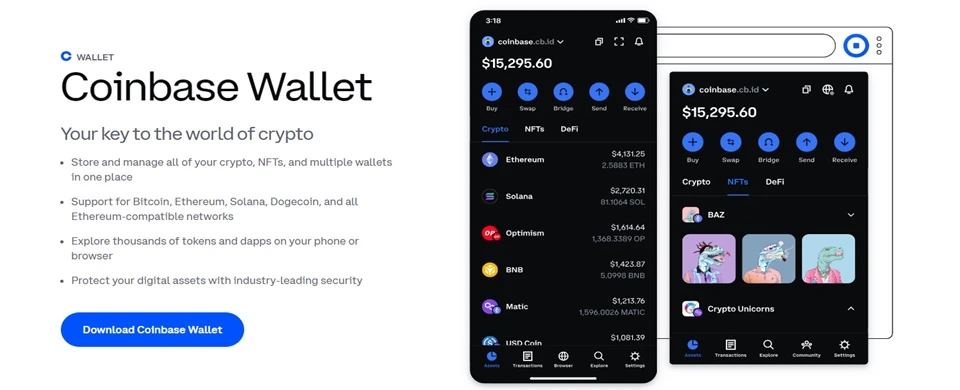
The American company was established in 2012 as a decentralized crypto exchange and has its headquarters in San Francisco and is even listed on NASDAQ. You can perform transactions like buying, swapping, receiving, bridging, and even browse dApps on Coinbase.
- The wallet is easy to install and compatible with both Android and iOS devices.
- It also has a desktop app for both macOS and PC.
Users can access an array of tokens on Coinbase, including all ERC 20 tokens, and all EVM-compatible chains like Avalanche, Polygon, BNB Chain, Polygon, and others.
The wallet is available in 10 languages including English, French, Chinese, Spanish, Russian, Portuguese, Korean, German, Italian, and Japanese.
Our wallet review rated it 4.5/5 because of its versatility and continued improvement over the years.
-
Pros
-
 Simple to set up and use as a crypto and NFT storage
Simple to set up and use as a crypto and NFT storage -
 Compatible with all other BIP39 wallets
Compatible with all other BIP39 wallets -
 It supports a wide variety of tokens
It supports a wide variety of tokens -
 Instant withdrawals
Instant withdrawals -
 The Wallet is very transparent and clearly displays all its crucial information for users to access
The Wallet is very transparent and clearly displays all its crucial information for users to access -
 You can reach customer support through email, chat, and phone
You can reach customer support through email, chat, and phone
-
Cons
-
 Unpredictable transaction fees
Unpredictable transaction fees
5. Exodus Wallet – The Best Wallet for User Autonomy
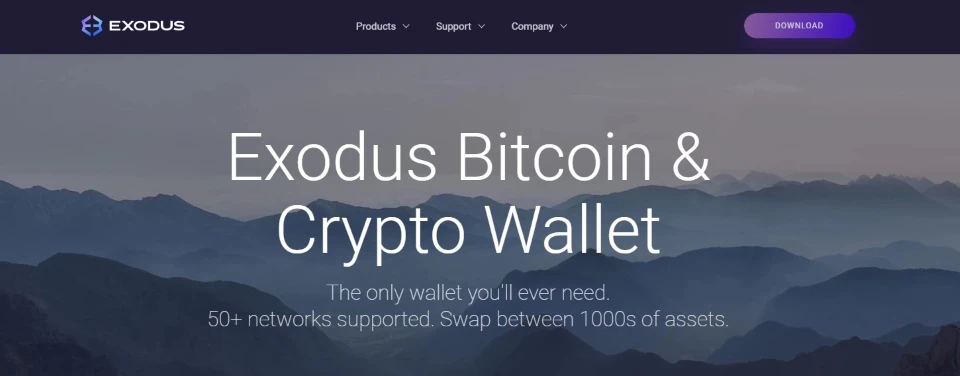
Exodus Wallet was launched in 2015, and its parent company has its headquarters in Nebraska. The team that developed the wallet aimed to make it easier for everyone to access cryptocurrency.
It is an excellent wallet of choice for beginners as it has a simple user interface and instant chat support.
The network charges a fee to send assets but receiving them is free. It also allows users to buy, sell, and swap within the wallet. Exodus is available for both Android and iOS. You can also access it via your desktop.
The wallet is only available in English at the moment. We gave this wallet a 4.4/ 5 rating.
-
Pros
-
 It is easy to set up and start operating
It is easy to set up and start operating -
 It is a secure multi-chain wallet, and you can use it to access all Ethereum, Solana and other layer 2 tokens
It is a secure multi-chain wallet, and you can use it to access all Ethereum, Solana and other layer 2 tokens -
 They are completely non-custodial, which puts the user in complete control of their private keys, heightening the security of their tokens
They are completely non-custodial, which puts the user in complete control of their private keys, heightening the security of their tokens -
 They have a regular update schedule, which simplifies the process of correcting any arising issues with the code
They have a regular update schedule, which simplifies the process of correcting any arising issues with the code -
 Users can stake their tokens and other assets
Users can stake their tokens and other assets
-
Cons
-
 The wallet does not support conversion between crypto and Fiat
The wallet does not support conversion between crypto and Fiat -
 The code is not open-source
The code is not open-source -
 The wallet doesn’t have 2FA
The wallet doesn’t have 2FA
6. MyEther Wallet – The Best Non-Custodial and Open-source Wallet
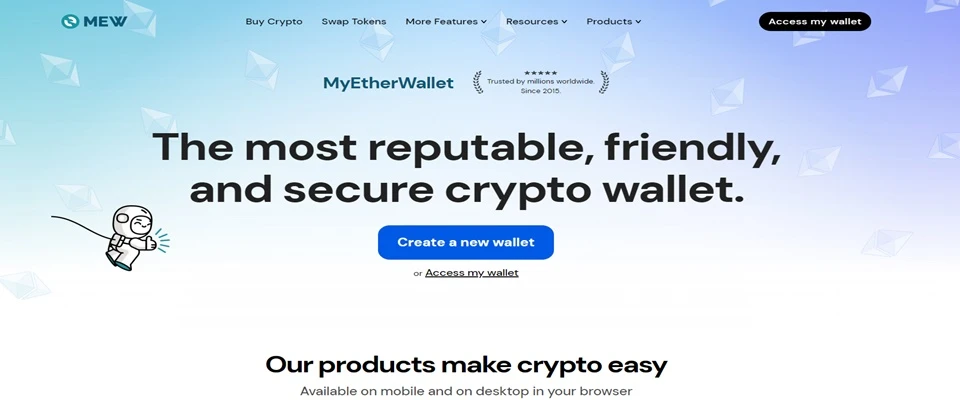
MyEther is a free open-source wallet from Ethereum. It was launched in 2015 and is headquartered in Zug, Switzerland. The Wallet allows users to buy, sell, swap, and perform a myriad of other transactions on their site.
- It is an open-source wallet, and users can also interact with smart contracts and dApps.
It is one of the most versatile wallets in the market, as it opens up all its users to the entire Web3 ecosystem. The software is available for Android, and iOS and also has Enkrypt, an extension that you can add to Chrome and perform your transactions.
My Ether wallet currently supports English and Russian.
We’d rate it 4.3 out of 5 because of its versatility and user-friendliness.
-
Pros
-
 Many features that support transactions connected to Ethereum and its assets
Many features that support transactions connected to Ethereum and its assets -
 NFT management, which makes it easy to manage the tokens within the wallet
NFT management, which makes it easy to manage the tokens within the wallet -
 It supports all transactions with Ethereum and all its compatible networks like Polygon, and Binance Smart Chain
It supports all transactions with Ethereum and all its compatible networks like Polygon, and Binance Smart Chain
-
Cons
-
 It doesn’t support non-Ethereum tokens
It doesn’t support non-Ethereum tokens -
 It’s a hot wallet, which makes it susceptible to phishing
It’s a hot wallet, which makes it susceptible to phishing
7. Torus Wallet – The Best for Beginners
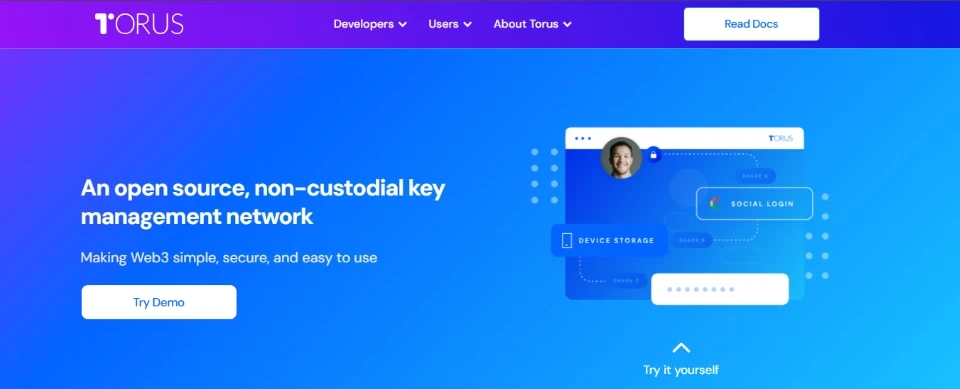
Torus Wallet was launched in 2018 and has its headquarters in Singapore. It is an open-source non-custodial key management system that allows users to buy, sell, and perform transactions on Ethereum, Polygon, Reef, and xDai Chains.
- It has a simple user interface and people new to crypto and Web3 have an easy time getting started on it.
Torus rebranded to Web3Auth in 2022 and is one of the most successful projects backed by Binance Labs.
- Unfortunately, the wallet is only available in English.
This wallet review still allocated a 4.2 out of 5 score because of its simplified interface and versatility.
-
Pros
-
 Allows one-click login with Facebook, Reddit, Discord and Twitch
Allows one-click login with Facebook, Reddit, Discord and Twitch -
 The user has complete control over their keys. The platform also offers free cryptographic key repair
The user has complete control over their keys. The platform also offers free cryptographic key repair -
 It does not allow censorship commonly done by nodes
It does not allow censorship commonly done by nodes -
 Has OAUTH, which allows users to use a one-click login to access currencies in a decentralized exchange
Has OAUTH, which allows users to use a one-click login to access currencies in a decentralized exchange -
 It’s a native App, and users on Web 2.0 connect with Web3.0 entities
It’s a native App, and users on Web 2.0 connect with Web3.0 entities
-
Cons
-
 Users need existing Apps to integrate and allow logging into Torus
Users need existing Apps to integrate and allow logging into Torus -
 Open to hacking and phishing attempts
Open to hacking and phishing attempts
8. Binance DeFi Wallet – The Most Secure DeFi Wallet
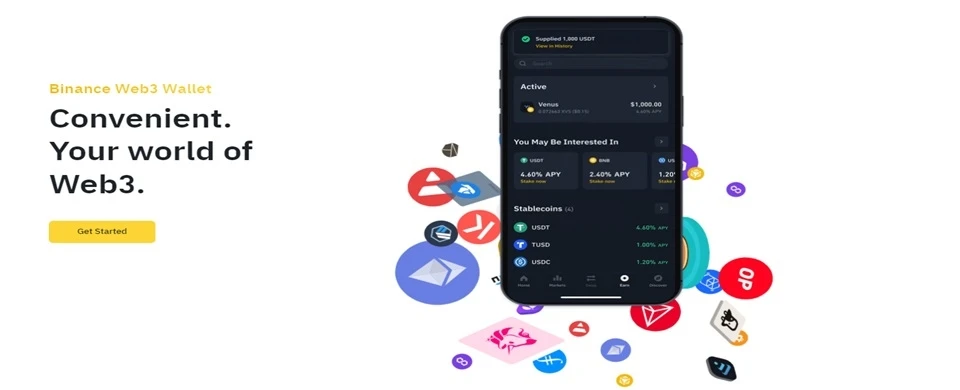
Binance is one of the largest centralized exchanges on the globe. The company has also expanded beyond the cryptocurrency exchange and invested in technology that supports decentralization.
The Binance DeFi Wallet was launched in 2022 by the Cayman Islands-based Binance and is a non-custodial and decentralized wallet on the network.
- It supports Binance chain, Binance Smart Chain, and Ethereum tokens and dApps.
Like all other Binance applications, Wallet Direct is available in 43 languages and is easy to access from around the world.
You can download an Android and iOS app version of the wallet, or install it on your desktop computer.
Our Wallet review gave this wallet a 4.1 out of 5 score.
-
Pros
-
 It supports multiple Web3 applications and tokens
It supports multiple Web3 applications and tokens -
 It has built-in exchange functionality
It has built-in exchange functionality -
 It has a high user trust rating
It has a high user trust rating -
 Very convenient for daily usage
Very convenient for daily usage -
 Eliminates the need to use seed phrases and private keys
Eliminates the need to use seed phrases and private keys -
 Full SegWiT address support, and partial Bech32 Support
Full SegWiT address support, and partial Bech32 Support
-
Cons
-
 New users claim the wallet is a little complicated
New users claim the wallet is a little complicated -
 Customer support needs to improve
Customer support needs to improve
9. Zerion Wallet – Ideal for Wallet to Wallet Transactions
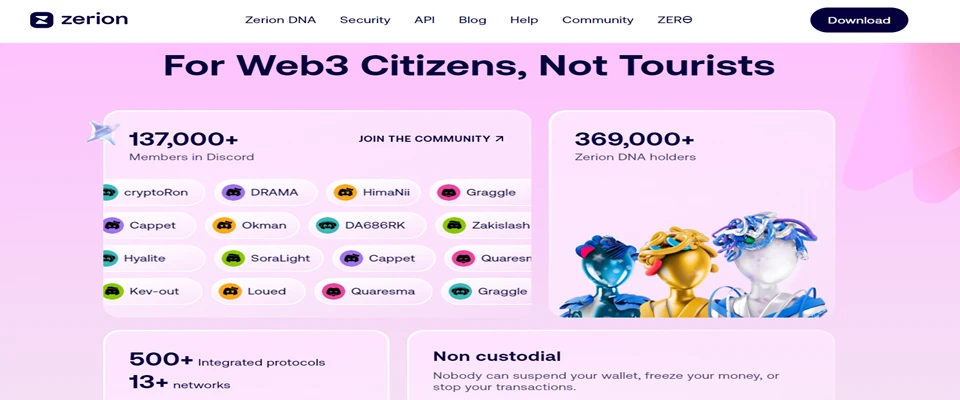
Zerion Wallet was launched in 2019 by the San Francisco-based company as the first completely self-custodial Web3 wallet. It features smart trade routing across all major decentralized exchanges. It is one of the most versatile wallets, supporting more than 10 chains across the network.
- These include Arbitrum, Solana, Gnosis, Optimism, Solana, Binance Smart Chain, and others.
It has a simple user interface, making it appropriate for new users. Its dApp connectivity via Wallet Connect makes it easy to sign transactions directly from your computer or mobile device. It has over 200k users monthly, which makes it moderately popular.
You can download a version compatible with your MacOS, iOS, and Android. Currently, the wallet is only available in English.
We ranked it 4.0 out of 5.
-
Pros
-
 It is a multichain wallet that supports thousands of assets
It is a multichain wallet that supports thousands of assets -
 It allows you to connect to any dApp in the digital space
It allows you to connect to any dApp in the digital space -
 Has fiat onramps that help you switch from cash to crypto within a short time
Has fiat onramps that help you switch from cash to crypto within a short time -
 Has multi-seed phrase management, making it easy to import Rainbow, Coinbase, Metamask, and several other wallets
Has multi-seed phrase management, making it easy to import Rainbow, Coinbase, Metamask, and several other wallets -
 Allows you to create a generative NFT that helps you learn about Web3 as you invest
Allows you to create a generative NFT that helps you learn about Web3 as you invest -
 Live price updates
Live price updates
-
Cons
-
 The exchange is unregulated
The exchange is unregulated -
 The app is complicated for beginners
The app is complicated for beginners
10. Argent Wallet – The Best for DeFi and Web3 Applications
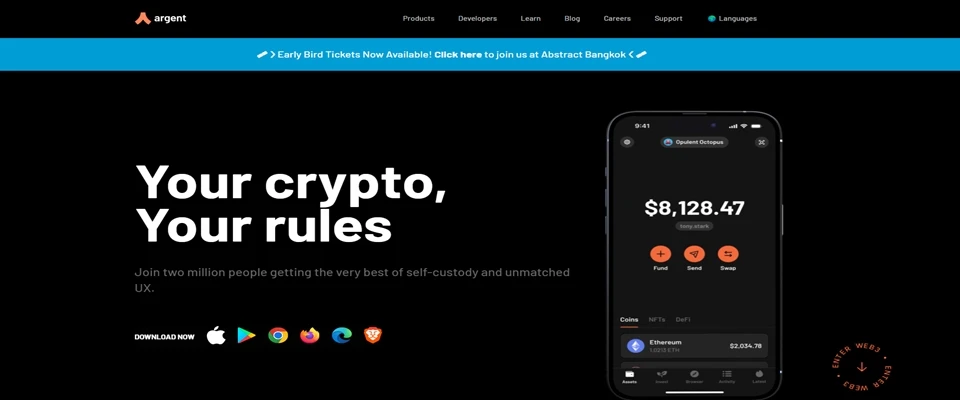
Argent Wallet was launched in 2017 by the London-based company. It allows users to store both cryptocurrencies and NFTs and also perform other transactions within the Ethereum Blockchain.
- It is a non-custodial wallet, and users have complete control over their private keys.
You can stake on the wallet as long as the tokens are Ethereum-based. It has an app version compatible with Android and iOS. It supports more than 240 tokens and is currently available in English.
We ranked Argent 3.9 out of 5 because it isn’t popular yet, and is limited to Ethereum.
-
Pros
-
 It has a user-friendly interface
It has a user-friendly interface -
 It is very secure
It is very secure -
 You can use credit and debit cards to purchase cryptocurrencies
You can use credit and debit cards to purchase cryptocurrencies -
 t offers leveraged stakes with the potential for very high yields
t offers leveraged stakes with the potential for very high yields
-
Cons
-
 Card transaction fees are high
Card transaction fees are high -
 Does not support any other tokens besides Ethereum
Does not support any other tokens besides Ethereum
What is a Web3 Wallet?
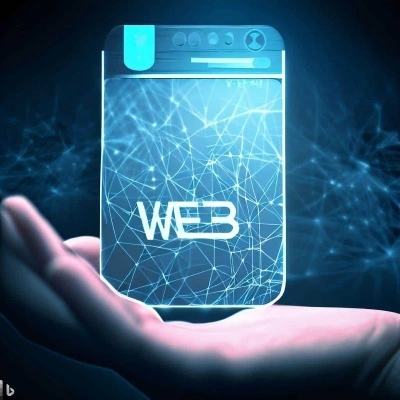
These are digital wallets developed and coded to interact with Web3 applications.
These wallets allow you to store and manage your NFTs, cryptocurrencies, and other tokens.
You can choose between:
- Custodial
- Non-custodial
- Smart contract wallets
Depending on your preferences, and the level of control you desire over your assets, choose what is right for you.
Web3 Wallets on Centralized Exchange (CEX) vs. Decentralized Exchange (DEX)
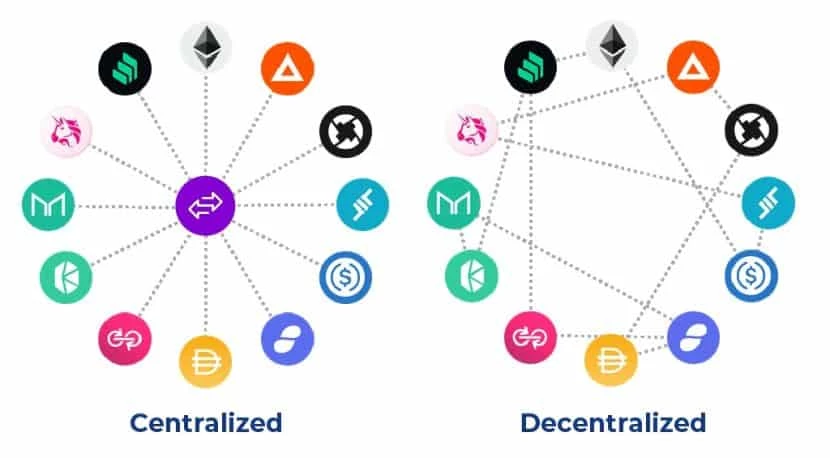
1. Centralized Exchange
They’re platforms that allow you to buy cryptocurrencies and other digital assets using fiat money. The exchange is your trustworthy broker, ensuring that you do not lose money or digital assets during transactions. Centralized exchanges were the earliest entry point into the world of crypto.
Examples of the most popular centralized crypto exchanges include:
- Binance
- Kraken
- Coinbase
- KuCoin
- Crypto.com
- Bitfinex
There are hundreds of others but with a smaller market share than those included in the above list. The best thing about these exchanges is that they are also hot wallets. It means that when you buy crypto on them, it’s automatically stored in the exchange-hosted wallet.
The inhibition connected to these wallets is that they are custodial and your private keys will be controlled by the centralized exchange.
However, they’re still a great starting point in crypto transactions because they simplify the entire process and give you direct access to thousands of cryptocurrencies.
Benefits of Hot Wallets
The Risks of Using Hot Wallets
2. Decentralized Exchange
Decentralized exchanges allow direct peer-to-peer transactions, eliminating the intermediary. The distributed ledger or blockchain takes the place of the third party. They’re different from the conventional exchange where an organization hosts and controls all transitions, instead, they use smart contracts. DEXs also allow you to transact autonomously on the blockchain. Additionally, they allow staking, loans, and yield farming.
Here are some examples of the most popular decentralized exchanges:
- OKX
- Pancake Swap
- ApeSwap
- Huobi/iToken
- SushiSwap
- Kine
Cold wallets are a little different from hot wallets because they’re disconnected from the internet. They’re often hardware devices that you buy and store with you. Once you set up the wallet, you’ll get a private and public key. The private key secures the location that your crypto occupies on the blockchain. You can use the public key to send assets into the wallets, receive tokens, and perform other transactions.
Follow these simple steps to set up a cold wallet:
- Purchasing the Wallet: Buy a hardware wallet from a trusted company. Examples include Ledger, Trezor, and ELLIPAL. The typical hardware packaging will have the wallet, USB cable, and some cards to write seed phrases.
- Linking the Companion Software: Connect the hardware wallet to your phone or computer. Most cold wallets come paired with software that you can access from the manufacturers’ page. Most hardware wallets guide you to the download page for the companion software application.
- Creating the Seed Phrase: The app will give you prompts on the steps to follow until to get the pin and also access the seed phrases. Write down the phrases in the cards and store them safely.
- Creating a Wallet: Create separate wallets for all software applications you’ll be working with. For example, you’ll need a separate Bitcoin wallet for Bitcoin and also a separate Ethereum wallet for Ethereum.
- Linking a Hot Wallet: Once the setup is complete, you can link a hot wallet to spend and sign transactions.
The Benefits of a Cold Wallet
The Risks of Using Cold Wallets
Importance of the Wallets
Web3 is set to revolutionize how people interact with the internet, and wallets that can access dApps will keep gaining prominence.
Here are some ways in which wallets are important:
- They have a friendly user interface and offer users access to trading and storage services with a few minutes of setup.
- They have community support in the form of DAOs where people learn from each other and explore the full potential of Web3.
- They enhance anonymity when performing online transactions.
- They give users complete control over their assets and also protect them from attacks that could lead to asset loss.
1. Hot Wallets
Hot wallets are internet-enabled and always online. They include all wallets stored in devices such as phones, computers, and other gadgets that can connect to the internet.
- Examples of hot wallets include Coinbase, Electrum, MetaMask, and Exodus among others.
Hot wallets also fall into the following categories:
Desktop Wallets
A desktop wallet is simply an application you install on your computer and use to manage your private keys.
- The key feature of a desktop wallet is that it is technically a hot wallet since it’s always connected to the internet when in use.
- Since you’re not on a crypto exchange, the wallet is non-custodial, meaning you have complete control of the private keys and your assets.
- Desktop wallets offer a little more security than what mobile wallets offer, but a little less than what hardware wallets offer.
Mobile Wallets
Mobile wallets are software programs that secure your funds and allow you to interact with them using a phone or other mobile device.
- Mobile wallets offer the least level of security as they’re most vulnerable to hacking.
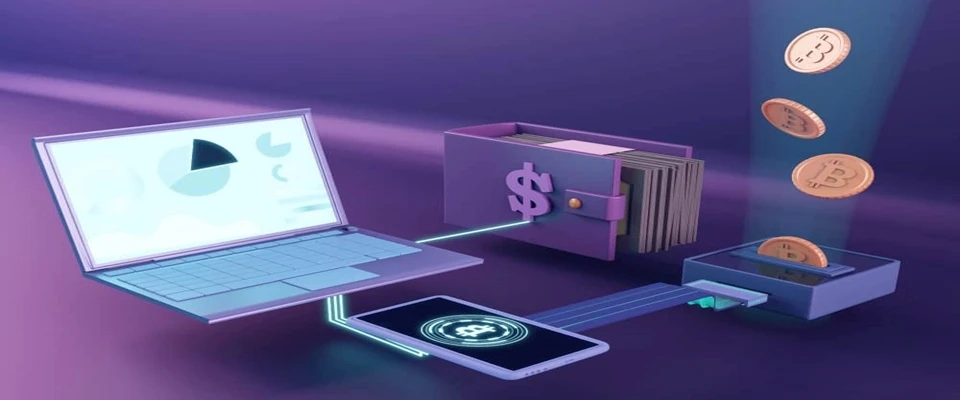
2. Cold Wallets
Cold wallets are different from hot wallets because they store your crypto offline.
Most cold wallets resemble a flash drive or paper and remain offline most of the time & they hold the private keys to your assets.
Here’s more about cold wallets:
Hardware Wallets
Hardware wallets are physical devices that store the private keys to your crypto.
- Even though some hardware wallets resemble a credit card, the majority of them look like a flash drive.
- Examples of hardware wallets include Ledger Nano X, Trezor Model T, and KeepKey among others.
Paper Wallets
Paper wallets are pieces of paper containing your private keys and the QR codes you can use to facilitate digital transactions.
- Paper wallets are removed from the internet and cannot be connected to it, which makes them more secure than hot wallets.
The Benefits & Drawbacks of Web3 Wallets
Benefits
These wallets offer the following benefits to everyone transacting on them:
- Security: There’s no third party controlling transactions, instead, the more reliable and immutable blockchain verifies and records transaction data. This speeds up and heightens the safety of the transaction.
- Convenience: You can receive, send, and perform other transactions with your digital assets from anywhere in the world as long as you have access to a device that can log you onto your wallet.
- Privacy: The wallets are non-custodial, which means there’s no third party accessing information about your transactions. All transactions happen on a secure and highly decentralized blockchain.
- Autonomy: You do not need approval from anyone to make financial transactions. You can simply log onto your device and initiate transactions. The smart contract system used to verify transactions does so automatically, provided all the conditions have been met.
The Potential Drawbacks
- Compatibility issues: The wallets aren’t automatically compatible with all the blockchain networks you might want to transact on, which limits your operations.
- UX problems: Some have complicated user interfaces, which makes it hard for first-time users to install and operate them.
- Transaction fees: Some wallets charge extremely high transaction fees, limiting your profit.
Web3 is taking the power to control digital transactions from mainstream financial organizations and giving it to the users. Peer-to-peer and blockchain transactions will overtake the current systems controlled by centralized authorities, and the wallets are here to ensure the user gets complete autonomy over their assets.
It is important to learn how crypto and related transactions can improve when you invest in decentralization.
Frequently Asked Questions
What is the best Web3 wallet?
Different wallets have features that make them better than the others. However, MetaMask tops the list as it is versatile, has the best security measures, is non-custodial and multi-chain.
What is the easiest Web3 wallet?
The easiest Web3 wallet to set up and start using is the Torus. You should check it out if you’re a beginner in crypto.
What is the most user-friendly Web3 wallet?
MetaMask is still the most user-friendly wallet. Coinbase comes a close second while Trust Wallet from Binance Labs is third.
Is MetaMask a Web3 wallet?
Yes, MetaMask is one of the most trusted and popular wallets. It is self custodial and used by millions worldwide because of the ease of access to dApps it offers.
Explore Other Wallets
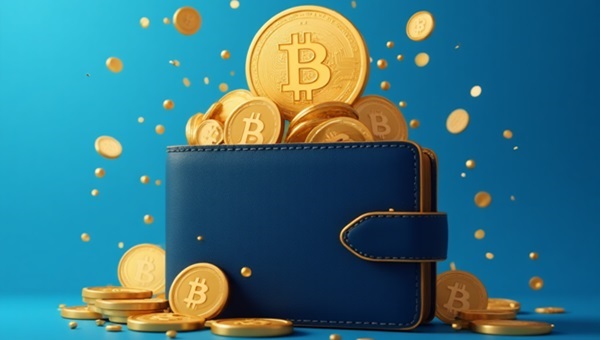

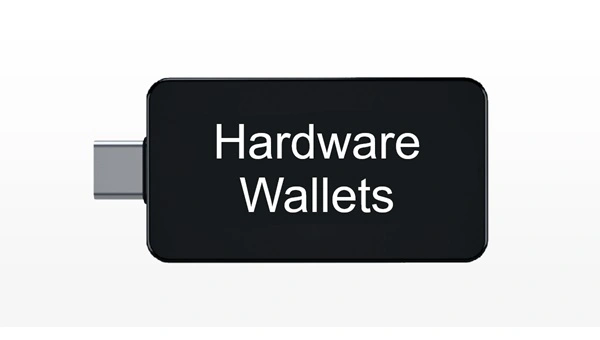
He started writing content online for various reasons, including accessing a community of music lovers. He began writing 2011 music reviews and PR releases for electronic music releases before shifting my focus to more crypto-oriented content after getting heavily involved with blockchain technology in 2013.


Facts Checked by Josip Putarek

 Fact checked by
Fact checked by 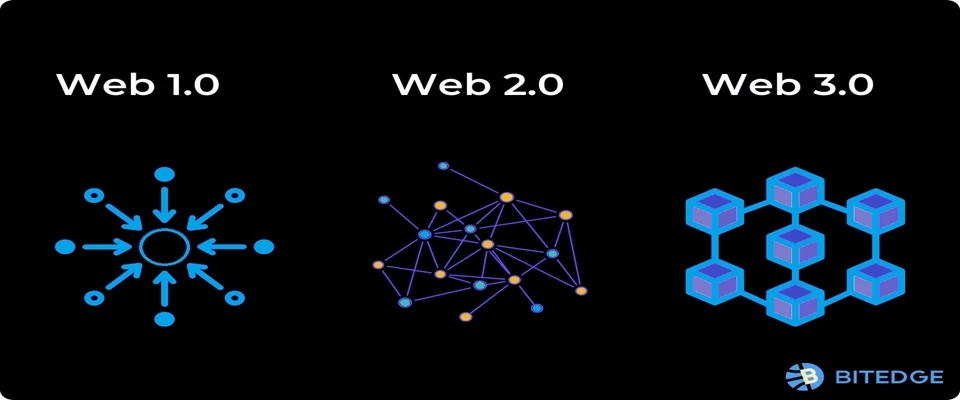

 v.hatze@yahoo.com
v.hatze@yahoo.com 